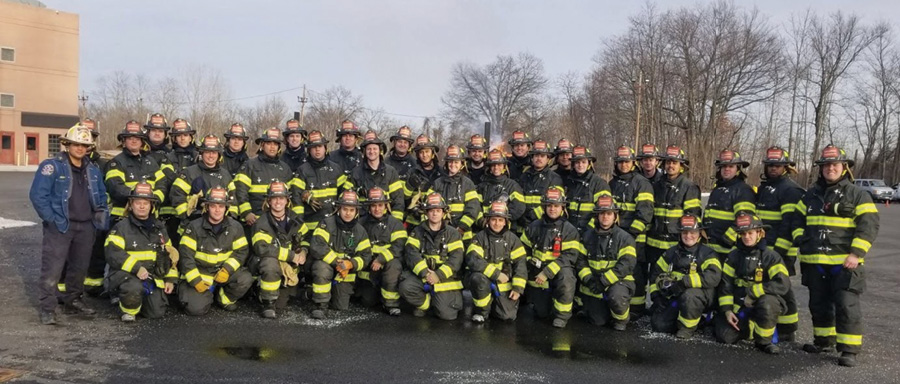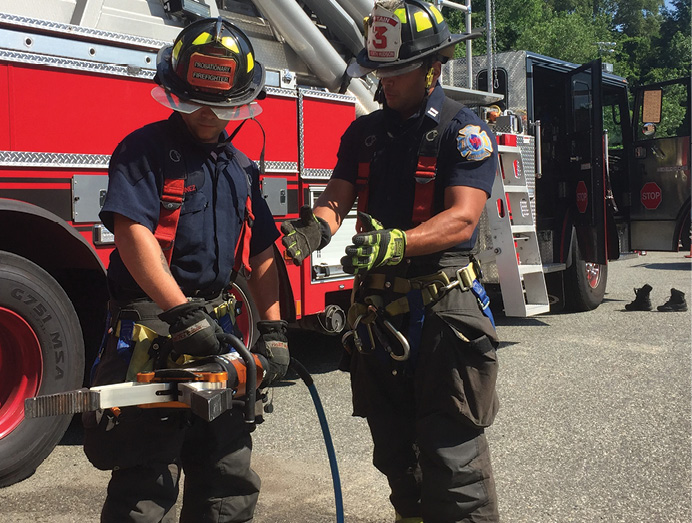BY ALIDER PRATTS
Back in 1995, I chose to serve my country as a United States Marine. Professionally, it was absolutely one of the best decisions that I have ever made. The United States Marine Corps’ core values of honor, courage, and commitment, along with valuable leadership traits, have guided me through my adult life and at every stage of my career. Every branch of the armed forces has its own set of values that it requires all members to live by. Along with these values and traits, the military instills teamwork, discipline, dedication, and a sense of duty in its service members. Such traits are hard to come by and what employers everywhere seek in prospective workers, especially in the fire service, law enforcement, and first responder agencies. Military veterans have proven their eagerness and willingness to serve and obviously make great candidates for public safety careers.
Veterans in the Workforce
Over the past few years, the U.S. workforce has made strides in recognizing the sacrifices made by those who served our country by making a commitment to hire military veterans. Campaigns such as the U.S. Chamber of Commerce’s “Hiring Our Heroes” assist veterans with securing employment in public and private sectors. Many public safety agencies offer military preference for veterans taking entry-level employment examinations. Often, a veteran receiving a passing score is placed on a prospective job appointment list above nonveterans, regardless of their scores.
RELATED
A New Generation of ‘Veteran’ Firefighters
Military Veterans in the Fire Service

(1) Photos by author.
Many fire departments have hired a considerable number of military veterans over the past few years. North Hudson (NJ) Regional Fire and Rescue has hired 101 military veterans since 2013. This includes our recent graduating class of 37 recruits, all of whom are combat veterans from all branches of the armed forces (photo 1). Adding veterans to the firefighting ranks can be beneficial and may be a main contributing factor in an organization’s effectiveness and efficiency.
Desirable Skills and Qualities
Resource management is an essential function and component of an incident command system. The importance of understanding the resources available to you within your toolbox cannot be overlooked. To get the highest level of productivity from newly hired recruits, especially those with military experience, you must become familiar with this valuable human resource. Knowing how to manage, mentor, and develop the military veteran probationary firefighter (probie) will benefit your organization and the recruits’ professional development.
Work well under pressure. Military veterans have been tested and tried to perform under extreme and stressful situations. We teach our recruits this during their fire academy and on-the-job training. Make it common practice to evaluate them during difficult training evolutions and while they are operating on the fireground. Adjust and tailor your department’s training program to ensure that it is constantly challenging your veteran probies.
Understand the “chain of command.” The fire service functions as a paramilitary organization. The organizational structures, customs, and chain of command within fire departments are based on those found in the military. Veterans are already used to working within this type of system, making it easier to transition into their new career in public safety.
Possess technical skills. Many veterans possess skills that are also valued in the fire service such as those of a medic/first responder, a hazmat technician, a swiftwater rescuer, a construction worker, and even a firefighter. Although the veterans still must be trained according to local and state standards and your department’s standard operating procedures, veteran probies who possess these skills offer a solid foundation for the rest of their fire service training. A current list of their prior skills, certifications, and experience can guide you in deciding station assignments.
Exhibit leadership. Regardless of the rank obtained in the military, all service members undergo extensive leadership training. Noncommissioned and commissioned officers alike take pride in leading others. Some of our veteran probies have led troops into battle, just as our company officers lead their crews into burning structures. Given the right guidance and motivation, veterans will eagerly seize the opportunity to lead again. Assigning fire academy recruits to the positions of class leader and squad officer is a great way to kick-start their fire service leadership training. Fire officers should always be looking for opportunities to help subordinates transition into leadership roles. This shouldn’t be something that applies solely to your more seasoned firefighters. Along with the traditional housework or apparatus maintenance, probies can also be given duties and tasks that foster a sense of ownership. Simple assignments such as “housewatch” during a period of their shift, ensuring that the apparatus inventory logs are up to date, and helping other probies practice their ropes and knots help them develop leadership skills early in their careers.
Are adaptable. The military teaches you to complete the mission regardless of the circumstances. There is no room for error—or excuses. Veterans are accustomed to effectively performing tasks under extreme conditions. The fire service is no different. Failure to complete the fireground tactical priorities of life safety, incident stabilization, and property conservation can be a matter of life and death. Set up challenging company drills that require probies to constantly think on their feet. Conducting tabletop exercises around the firehouse kitchen table is also a tool for determining the probie’s ability to troubleshoot fire and emergency situations.
Continuing Education
The U.S. Department of Veterans Affairs’ (VA) GI Bill assists veterans with funding a college education. The VA also offers financial assistance for on-the-job training (OJT) and apprenticeship programs. If your fire department participates in the program, the VA will recognize the fire academy and probationary period training as a VA-approved OJT program. The fire department will have to submit an application and a training outline with the local VA state approving agency. Once approved, the department will have to designate a training officer as a VA OJT certifying official, who will be responsible for filing and maintaining training records for each OJT participating veteran. To receive financial assistance for OJT, the veteran must also submit an application to the VA. If eligible, he will receive a VA OJT Certificate of Eligibility, which must be submitted to the fire department’s certifying officer. More information is available on the VA’s Web site: https://bit.ly/2E9C34m.
Unique Challenges
Veterans face unique challenges when transitioning back into the civilian workforce. Along with struggling to find meaningful employment in a difficult job market, many veterans are still trying to adjust to the culture change felt when reentering civilian life. The paramilitary structure, along with the culture of brotherhood and sisterhood of the fire service, certainly helps to make the transition easier.
New role as a probie. Many of our veterans have held supervisory positions in the military. Although such experience is an advantage, it sometimes makes it more difficult to accept their new, less glamorous role as a probie. They have embraced the role of pushing forward and leading others into combat, and now they are pushing a broom and mop, cleaning the bathrooms, and doing the dishes. They are used to training younger members and showing them the ropes, and now they are on the receiving end. At times, the veteran’s new company officer, or chief, may be the same age or even younger. To become successful, egos must be checked. Fire officers need to remind the military veteran probies that although they may have proven themselves in the military, they must do the same in the firehouse. This is a rite of passage and a step that all firefighters before them have gone through (photo 2).

Employee assistance. Recognize that many vets have seen and experienced things in combat that many of us can never imagine. This takes a mental and emotional toll on them. Many things that we come across in our normal course of duty may bring back suppressed feelings and thoughts. Some veterans want to put their experiences in the military behind them and move forward. It is perfectly acceptable to thank them for their service; however, refrain from asking them about what they did or saw in combat. This may inadvertently trigger feelings of stress or anxiety. Make sure that you monitor the veteran probie for signs of mental or emotional distress. Although most of us in the fire service have never received formal training in this area, possible indicators include sudden apathy, a loss of appetite, feeling on edge, or drug or alcohol abuse. Make sure that you establish clear lines of communication and express an “open-door policy” when it comes to employees coming forward with personal issues that can affect their work performance.
The VA provides medical and mental health assistance for veterans (https://www.mentalhealth.va.gov/). International, state, and local firefighter unions, along with fire departments, provide employee assistance programs as well.
An extremely large number of military veterans have been returning to civilian life each year. An increasing number of them are seeking careers in the fire service. Fire departments that actively hire military veterans recognize that it is an honor and a privilege to support members who served their communities and their country. Understanding the benefits of adding military veterans to the firefighter ranks can better prepare the fire department’s leadership to train and manage this valuable human resource.
ALIDER PRATTS is a battalion chief with North Hudson (NJ) Regional Fire & Rescue, where he serves as the department’s chief of rescue services and its Veterans Affairs on-the-job training certifying official. He is a New Jersey state-certified fire instructor and teaches at the Monmouth County (NJ) Fire Academy. Previously, Pratts was a sergeant in the United States Marines.

